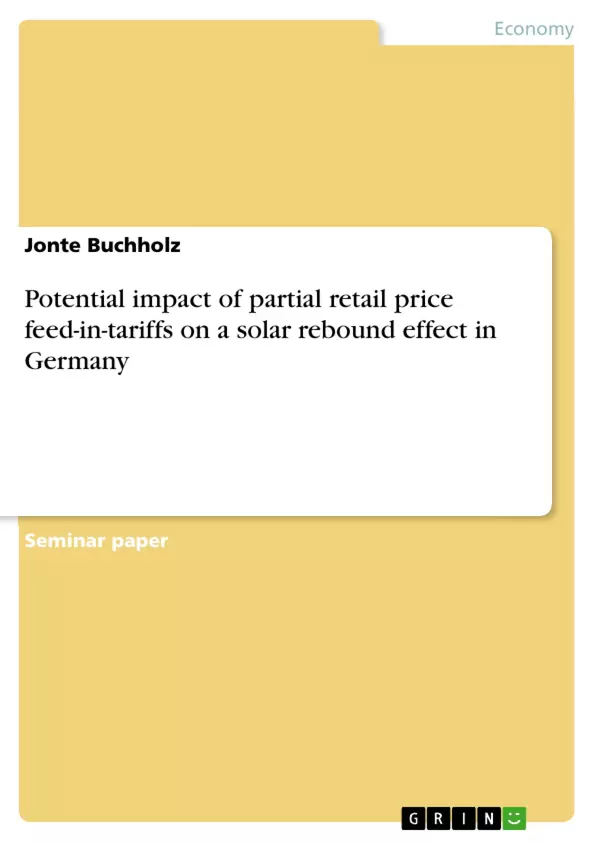In order to contribute to an understanding of the impact of the so called ‘solar-rebound effect’ (SRE) as described by Oliver et al. (2019), it is the goal of this paper to formulate a hypothesis regarding the potential impact of partial electricity retail price (ERP) feed-in-tariffs (FiT) on this effect in Germany, drawing on the theoretical model developed by Oliver alii (2019) and on empirical insights regarding the SRE, observed in Phoenix (Arizona) by Qiu alii (2019) and in Sydney by Deng & Newton (2017).
Therefore, the research question that I would like to answer in the following argumentation, is: Has the policy measure of the Renewable Energy Sources Act (EEG) feed-in tariff scheme an impact on the solar-rebound effect in Germany, and does the mechanism mitigate or intensify the SRE compared to solar rebound effects observed in Arizona by Qiu et al. (2019) and in Australia by Deng & Newton (2017)?
In Germany, there are a variety of different legal mechanisms applied to support the installation and usage of renewable energy. The most important one being the Renewable Energy Sources Act (EEG) which is widely acknowledged and adopted as a model by other countries. The regulation led to an increase of the portion of renewable energy on total gross electricity consumption in Germany from 2009 to 2019. In 2019 renewables had a share of 43% on gross electricity consumption, of which 8.2% were generated by solar systems. Approximately 1/3 of the total amount of photovoltaic (PV) power production capacity in Germany is owned by private households, which are acting as prosumers. These numbers underscore the importance to understand effects on residential photovoltaic system usage to implement effective policies in line with climate objectives.
Inhaltsverzeichnis (Table of Contents)
- Introduction and motivation
- Research question
- Microeconomic theoretical background
- Rebound effects
- Microeconomic foundation
- Impact of different schemes on the solar-rebound effect
- Net-metering
- Gross-metering
- Empirical evidence
- Sydney (Gross-metering)
- Phoenix (Net-metering)
- Theory and Empirical evidence
- The solar-rebound effect in Germany
- Situation in Germany
- Hypothesis
- Discussion and Conclusion
Zielsetzung und Themenschwerpunkte (Objectives and Key Themes)
This paper aims to formulate a hypothesis regarding the potential impact of partial electricity retail price (ERP) feed-in-tariffs (FIT) on the 'solar-rebound effect' (SRE) in Germany. It draws on the theoretical model developed by Oliver et al. (2019) and empirical insights regarding the SRE observed in Phoenix (Arizona) by Qiu et al. (2019) and in Sydney by Deng & Newton (2017). The research question explores whether the Renewable Energy Sources Act (EEG) feed-in tariff scheme impacts the SRE in Germany and how it compares to solar rebound effects observed in Arizona and Australia.
- The impact of feed-in tariffs on the solar-rebound effect
- Theoretical framework for understanding rebound effects
- Empirical evidence from different locations and schemes
- The role of the Renewable Energy Sources Act (EEG) in Germany
- Potential implications for achieving climate objectives
Zusammenfassung der Kapitel (Chapter Summaries)
- Introduction and motivation: This chapter sets the context by discussing the importance of renewable energy in achieving climate goals, particularly in the light of the European Green Deal (EGD) and the global recession. It emphasizes the significance of understanding the impact of policies supporting renewable energy on residential photovoltaic (PV) system usage.
- Research question: This chapter presents the central research question of the paper: Does the Renewable Energy Sources Act (EEG) feed-in tariff scheme have an impact on the solar-rebound effect in Germany, and how does it compare to similar effects observed in Arizona and Australia?
- Microeconomic theoretical background: This chapter provides a theoretical framework for understanding rebound effects, drawing on the work of Jevons (1865) and discussing the substitution and income effects that can contribute to these effects.
- Empirical evidence: This chapter reviews empirical studies on the solar-rebound effect conducted in Sydney (gross-metering) and Phoenix (net-metering), providing insights into how different schemes can influence the effect.
- The solar-rebound effect in Germany: This chapter explores the current situation of solar energy in Germany and proposes a hypothesis regarding the potential impact of partial electricity retail price feed-in-tariffs on the solar-rebound effect in the country.
Schlüsselwörter (Keywords)
This paper focuses on the solar-rebound effect, feed-in-tariffs, renewable energy, climate change, the European Green Deal, the Renewable Energy Sources Act (EEG), residential photovoltaic (PV) systems, net-metering, gross-metering, and the economic impact of energy policies.
Frequently Asked Questions
What is the solar-rebound effect (SRE)?
The solar-rebound effect occurs when households increase their overall electricity consumption after installing solar panels, potentially offsetting the environmental benefits.
How does the Renewable Energy Sources Act (EEG) affect the SRE in Germany?
The paper investigates whether the German feed-in tariff scheme mitigates or intensifies the rebound effect compared to systems in Arizona (USA) or Sydney (Australia).
What is the difference between net-metering and gross-metering?
Net-metering allows prosumers to offset their consumption with their production, while gross-metering tracks production and consumption separately, often with different tariff rates.
What percentage of solar capacity in Germany is owned by private households?
Approximately one-third of the total photovoltaic power production capacity in Germany is owned by private households acting as prosumers.
Why is the income effect important for rebound theories?
The income effect suggests that savings from cheaper solar energy increase a household's disposable income, which may then be spent on other energy-intensive activities.
- Quote paper
- Jonte Buchholz (Author), 2020, Potential impact of partial retail price feed-in-tariffs on a solar rebound effect in Germany, Munich, GRIN Verlag, https://www.grin.com/document/1307993



